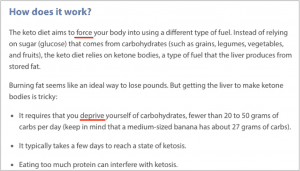There is a lot of “Fake Science” out there. It’s clear that we live in an age of misinformation and sensationalized headlines, and it’s often difficult to discern what contains real evidence, and what is lacking. This week, I’m motivated by a particular article by a “reputable” source. Aside from pointing out the specifics of this particular article, I want the larger lesson to be to understand how to read between the lines of an article and search for evidence, regardless of how credible a source may seem.
Who’s the Culprit?
Harvard Health strikes again with ignorance and false claims. I try not to respond negatively too often, but I couldn’t let this one go.
Does talking about an awful publication give it more attention than it deserves? Or is it more important to point out the fallacies for all to see? I don’t know that there is a “right” answer to that question, but in this case the critic and vocal dissenter won out. We can’t let flat out wrong claims perpetuate and become “truth” as happens too often in medicine.
Bias in Language
- It starts right off the bat by the language use in this article. “The keto diet aims to force your body into using a different fuel.” Force your body? That assumes your body doesn’t want to burn fat, so we have to force it against its will to do so. That is certainly a “carb centric” view point!
Why not say “allow your body to use a different fuel.” The clear assumption/bias is that we are meant to be carbohydrate eating, glucose burning machines. But is that true? Is that how we were meant to be? Snackwells, Nabisco and Tony the Tiger sure think so, but I think evolutionary biology may differ.

- “It requires that you deprive yourself of carbohydrates.” Deprive? There is certainly no deprivation on a wonderful array of veggies like cabbage, Brussels sprouts, cauliflower, broccoli, peppers, green beans, and so on. I also don’t think anyone would complain about the health risks of depriving ourselves of white bread, bagels, candy, cookies, cakes etc. Would Harvard also talk about how vegans deprive themselves the nutrient density found in eggs, fish and meat? I think not.
Lacking Evidence
Next comes the section on “Keto Risks.”
- Saturated fat is the obvious one, and I have written enough about that one to not address it in this post. You can read more here, here, and here. The article also seemingly adds a source with what sounds like evidence, but provides no link to the study.

- Liver problems. How could they reference “liver problems” with no references or specifics and fail to mention that LCHF is one of the best nutritional interventions to treat fatty liver, the fastest growing cause of liver disease in the country. And what does “liver problems” even mean? It seems clear that there is a clear lack of understanding here.
![]()
- Kidney problems. The only concern of too much protein is in individuals with complete kidney failure. In healthy individuals, high protein consumption can increase the renal filtration rate, but there is no evidence to show resulting kidney damage. And where did they get the current recommendations for protein intake? 46 grams per day for women and 56 for men? Even using the lower estimates of 0.5 grams per pound would make this 90 grams per day for the average 180-pound man. And this is a minimum recommendation.
- Fuzzy thinking and mood swings- This one is my favorite. Actually, LCHF keto diets are phenomenal at treating “fuzzy thinking and mood swings.” The article claims, “the brain needs sugar from healthy carbohydrates to function.” That could not be further from the truth. No matter how low our carbohydrate intake, glucose levels never drop to zero. I hope they have heard the term gluconeogenesis at Harvard because it is something our bodies have been doing for a few years. Well, maybe a few thousand years but let’s not be too picky. Yes, our brains require glucose. By no means do we need to eat that glucose.
- Last, they get one more jab in to say how “restrictive” the diet is.
![]()
Eating all the meat and veggies you want is restrictive? I like how they don’t refer to vegetarian or vegan diets as restrictive. Bias is very hard to overcome.
Also, you have to love the part about the weight returning when you resume a “normal” diet. Let me get this right. We shouldn’t change from a standard American diet to a low carb diet because the weight will come back if we go back to a SAD diet? So, we shouldn’t even try? Great rationale. How’s that working for our country?
The Danger of These Biased Articles
Now let’s look at the bigger picture. An institution with a reputable name publishes this paper. This paper has no scientific references, it is clearly biased, and has many statements that are blatantly false.
How are most people going to respond? I am afraid most people will accept it at face value. I mean, it’s Harvard for Pete’s sake!
My guess is most of my readers (you!) will say, “No way. People won’t fall for this garbage.” And for that I am thankful. But the problem is that my readers (you!) tend to be more astute and more interested in these topics and by habit critically analyze what they read. My fear is that does not translate to the rest of the population.
That is why the publishers at Harvard Health should be ashamed of themselves to allow their name on such an obviously biased and tainted article. Whether you believe in a low carb diet or not should have nothing to do with recognizing the falsehoods in their article.
In the end, I hope this will serve as a cautionary tale to remind us that everyone has a bias. Some hide it better than others. Some can be more objective than others. And as Harvard has proven, notoriety has nothing to do with it.
Let’s strive to be better.
Thanks for reading,
Bret Scher MD FACC



Trying not to become jaded but it is awfully difficult not to form the opinion that Harvard health is being deliberately deceptive. It goes beyond simply failing to retract a false claim, which is bad enough. It is a deliberate, premeditated agenda of deception.
Kind of makes you wonder…..
Absolutely!!
Thanks for this tool. So many people are led astray by these articles. I suspect they will become more malicious as the ketogenic lifestyle continues to grow.
Good point. The more threatened they become the more they will bare their teeth!
If I'm not mistaken, wasn't it guys who were once at Harvard that went on to create the great "food pyramid" back in the day? Now I'd like to see a study showing how many guys from Harvard are majority stockholders and upper tier executives at all the snack companies
Conspiracy theory! Those theories always scare the heck out of me. I try to give people the benfit of the doubt, but I fear that may often be misguided as you are suggesting
I'm still amazed how in almost 2019 there is still a debate on what the human animal was meant to eat…..All animals are born to eat certain foods, I guess it still has been determined what teh correct food is for the human animal . We know hat Ducks eat, we know what horses are meant to eat…What about the human animal…. Dr. Mcdouhgall claims we are starchevours , others calim carivour …I thibk it all comes down to un-natural sugar thats been killing people
Ken
I meant it hasn't been determined yet
Great points Ken. I think it was clear what we were meant to eat before the agricultural revolution. Since then, society, marketing, and money have confused what we were meant to eat.
Interesting term , that : ” Agricultural revolution”. Usually revolutions free oppressed people from harmful regimes. In this case we were in fact taken from a condition of healthy eating and sent into the captivity of an oppressive food regime after that revolution. Time for another revolution !
Hi Dr. Scher,
I realize your speciality is cardiology, but are you aware of any information that contraindicates a keto or LCHF diet for someone with kidney stones? I've been eating LCHF for a few months and it's worked well for me, but my husband has kidney stones (at least two that require medical intervention due to their size.) He's under the impression he should eat foods low in oxalate, which knocks out many veggies (spinach, kale, chard, asparagus). Are there any studies that looked at LCHF diet and kidney stones? Any advice regarding this?
Hi Anna. Here is an article I wrote about kidney stones. https://lowcarbcardiologist.com/kidney-stones-and-veggies-which-are-safe/. Hpoefully that will help. The first step is finding out what kind of stone he has (most are calcium oxylate). Then you can decide on dietary changes based on that. A LCHF diet can still work, but it may need adjustments. It may be best to work with a doctor with experience in LCHF to fine tune the diet. Bets of luck!